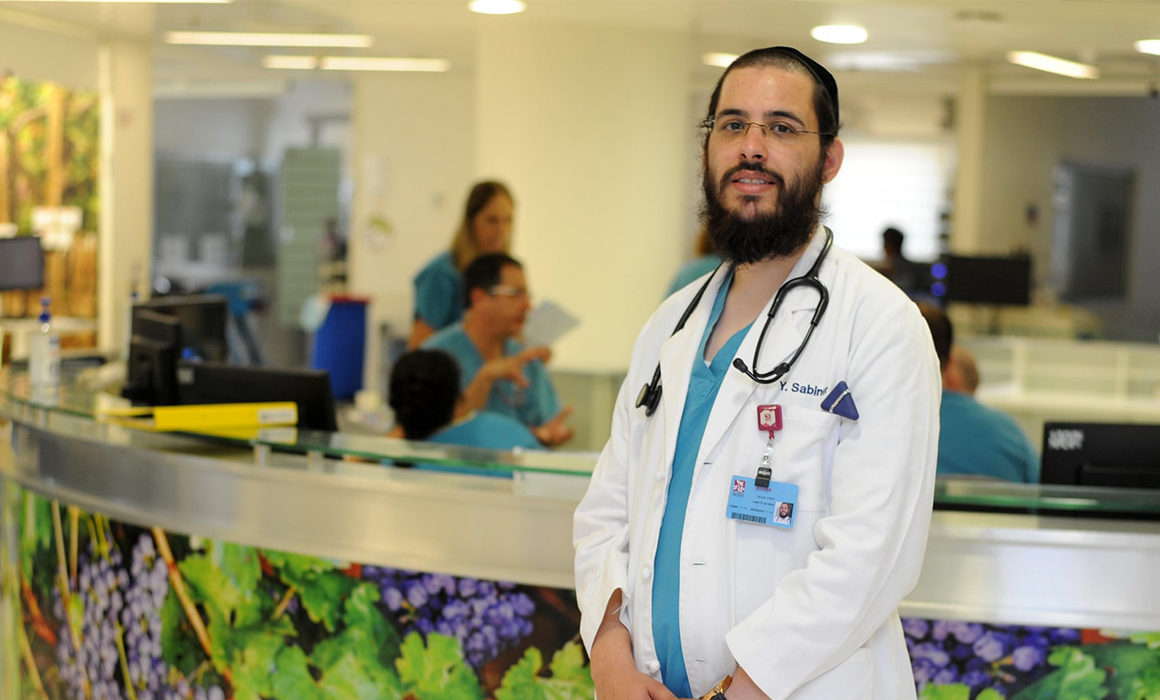From Israel to New York: Ultra-Orthodox Doctor Tries His Skills in America

Dr. Yehuda Sabiner does not back down from a challenge. Growing up a Hasid with little formal education, Dr. Sabiner closed the achievement gap to gain admittance to Technion–Israel Institute of Technology’s Rappaport Faculty of Medicine. And when the opportunity arose to do a month-long rotation at the prestigious NewYork-Presbyterian/Weill Cornell Medical Center in Manhattan, he jumped at the chance.
“I tried hard to get into this program,” said Dr. Sabiner, a 29-year-old father of three. “I had to interview, show my marks. And I got accepted into the student exchange program.”
If Dr. Sabiner wondered whether his education in Israel was up to par, the U.S. program showed him that he was well-trained. “I was worried that I’d be on a team with some geniuses and that I really wasn’t going to have any clue how to deal with the knowledge they have. But I never had a moment where I was face-to-face with something I didn’t understand. I can now say that I studied in one of the best places in the world, the Technion.”
Dr. Sabiner worked in Weill Cornell’s renal medicine department, looking in on transplant patients and donors, checking patients’ immune systems, and following up on surgeries. He even attended a major conference on renal cancer at Memorial Sloan Kettering Cancer Center. That’s quite a lot for anyone to take in, especially for a young doctor who only a few years ago was heading toward a life as a rabbi.
Like most Haredi men, Dr. Sabiner’s secular education ended when he was 13 years old. Afterward, he spent his days at the yeshiva, studying Jewish texts exclusively. However, Dr. Sabiner harbored a secret: Ever since childhood, he’d dreamed of being a doctor.
Nine months after his arranged marriage, he confessed his ambition to his wife Rachel. She cried, having expected she’d marry a rabbi or scholar. Ultimately, Rachel could not deny her husband’s dream.
Dr. Sabiner attended the Technion’s Mechina, a preparatory program that helps ultra-Orthodox students catch up and pursue higher education. The program proved so challenging, only 17 of 67 students of his cohort finished.
“It was a long, difficult journey,” said Dr. Sabiner. In 18 months, he learned the required math, physics, English, and writing skills to close a 12-year education gap and to qualify for entrance to the Technion. And in the summer of 2019 he finished his medical studies, becoming Israel’s first ultra-Orthodox doctor without having had a formal secular education.
Dr. Sabiner has since been encouraging others who are ultra-Orthodox to pursue medicine, but changing a society is difficult. Statistics show that the number of men studying in yeshivas has risen while fewer have entered academic institutions or the job market. Many of the families of those studying advanced Talmud in yeshivas live below the poverty line. Therefore, integration into the universities and elite professions can be a powerful force for the Israeli economy, reducing dependence on government subsidies and philanthropic contributions.
Dr. Sabiner is optimistic about the future. “We are going to give the ultra-Orthodox community the background, and we’ll see a revolution,” he said. He will begin his medical internship this fall at Sheba Medical Center in Israel’s Tel HaShomer, recently named by Newsweek as one of the world’s 10 best hospitals.